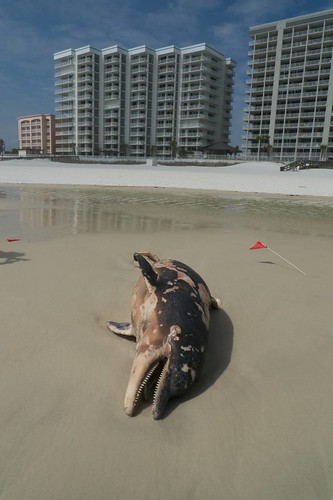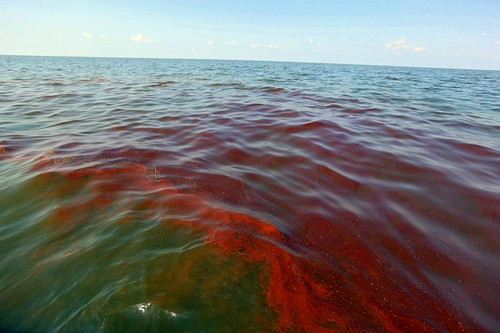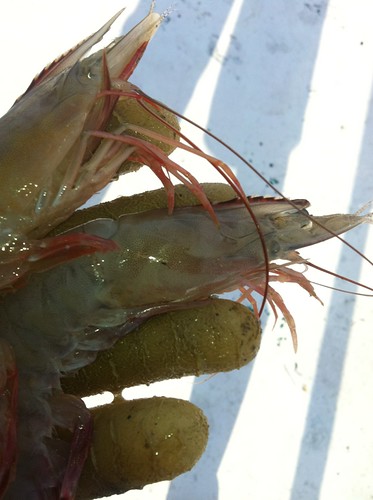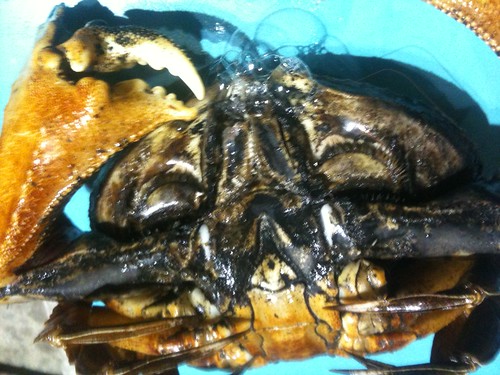A Gulf Chorus Fights BP's PR War
BP's newest PR salvo touting its Gulf cleanup hit a nerve with many residents still struggling to get their lives back (one ad captured this BP beach protest in the background). The oil behemoth's slickly produced pleas for Americans to “come on down” to the Gulf where the weather is warm, the food is sublime and the beaches are sparkling clean--at least in the commercials--has long stuck in the craw of people whose shrimp boxes are bare and whose beaches and bayous are sometimes littered with sticky tar balls and bloated dolphins.
But what if BP took a different tact this coming year? What if the oil giant —which scooped up profits worth nearly $5 billion last quarter and is planning to drill anew in the deepwater Gulf—decided to give a voice to those enduring the worst fishing season in memory? What if BP decided to tell the stories of families suffering from debilitating health problems they blame on the crude and chemical dispersants, oil that still mysteriously bubbles up near BP’s Macondo well 40 miles offshore?
If such a miracle were to take place, I have a great list of characters and stories for BP to choose from. They are all hard working people who care about their health and environment; many are salt-of-the earth folks who before the BP disaster rarely complained about the oil industry. But the oil spill changed that. And their stories have largely been ignored by the media and those in the halls of Congress, not to mention oil industry bosses in country club lounges. (Check out NRDC's film Stories from the Gulf that aired on the Discovery Channel earlier this year).

Orange Beach, AL, March 2011 Photo: Jerry Cope
Their stories are crucial; after all, who will protect the common working man and the critters in the sea, as one fisherman asked me? Who will stand up for their special interests? The problem is no politician wants to touch this Gulf tar baby. The oil, seafood and tourism interests all want to keep it quiet. The politicians just follow suit; after all, we know where their bread is buttered. The feds drew a line in the sand shortly after the well was capped last year. The oil is gone and the seafood is safe. End of story.
Except it isn’t. As NRDC’s Miriam Rotkin-Ellman and Gina Solomon reported last fall in their landmark peer-reviewed seafood safety study, the government simply doesn’t set adequate safety levels or test for many oil contaminants that can be harmful to seafood consumers, especially to children and pregnant mothers.
And every storm in the Gulf brings a fresh wave of tar balls and oily gunk onto the beaches and bayous. Where do you think that's coming from? Experts say plenty of oil is still sunk on the bottom, some of it in thick tar mats lying just offshore. It's not clear what will happen to it.
So this brings us back to BP's ads. Just in case anyone is out there with a sympathetic ear, a producer or reporter looking for a different version of reality to explore, here are some people who won’t be part of BP’s latest promotional onslaught. These are all people I've blogged about over the past year, folks who hardly any local politician, tourism official, seafood distributor or oil industry exec wants to promote. But they are there if you want to find them. And they won’t be silenced.

Oil in Barataria Bay, LA, Sept. 2011 Photo: PJ Hahn
Rosina Philippe, a leader of the Atakapa-Ishak community of Grand Bayou near Louisiana's oil-damaged Barataria Bay, where oil-soaked marshes in former shrimping grounds continue to die back and are still off-limits to fishing;
There's a big credibility problem between what we're seeing and what they're saying. There's a lack of confidence and full disclosure. It seems the public interest is not a priority. I'd much rather trust the people I know here, the network of people who want to make sure people and the environment are protected.
Dean Blanchard, Grand Isle, LA. Once one of the largest shrimp buyers on the Gulf coast, his business has been decimated by crude contamination that continues to roll in on his beach community that is closest to the BP Horizon well. He is considering filing for bankruptcy:
We’re seeing all kinds of problems, shrimp with no eyes and no baby fish. Boats are reporting five and six dead dolphins a day. Our beach is producing less than 1 percent of the shrimp (of normal catches). Grand Isle used to be the best fishing grounds in the country. Our bay is full of oil and our beach is dead they’ve used so many dispersants….I don’t think we’ll have a fishing industry here in two or three years. Everyone is running out of money...I’d rather have 100 Katrinas than one BP spill.
Bonny Schumaker, former NASA scientist and a pilot and executive director of On Wings of Care, who has repeatedly flown out into the Gulf to document on-going oil slicks that still pollute the areas near the Deepwater Horizon;
In fact, we found so much oil out in the Macondo Prospect (near the site of the April 2010 explosion), that we have an 11-minute video of it that never covers the same area twice! Not since last summer have we seen this kind of expansive surface sheen. Metallic-gray and rainbow swirls stretched for miles, mixed with dark-brown stuff that resembled weathered crude more than sargassum weed. And there were those round-shaped 'globs' of oil again, here, there, and everywhere it seemed. We did not want to see this stuff anymore!
Laurel Lockamy, Gulfport, MS, resident who has spotted about a dozen dead turtles and dolphins over the past year on nearby beaches, part of a record-breaking Unusual Mortality Event that government officials have been investigating since the oil spill began
“At first I could not believe what I was seeing,” Laurel says. “It looked like an alligator with a long tail. Then I got really angry. The smell was so bad, it was heartbreaking….It really gets to you. All these dead things on the beach. It never used to be like this before. I’m almost afraid to walk on the beach anymore.”

Shrimp with no eyes caught off Gulf coast November 2011.
Ryan Lambert, a director of the Louisiana Charter Boat Association and owner of one of the largest fishing and hunting lodges in Louisiana, is still fighting for reasonable compensation when his business plummeted after the oil spill, yet he worries oil drilling safeguards have not been put in place despite all the study and talk:
As the president’s national oil spill commission recommended earlier this year, we need to establish an independent drilling safety and environment office to make sure this disaster doesn’t happen again. And as the commission suggested, we should expand the role of the National Oceanic and Atmospheric Administration to ensure decisions about offshore drilling are based on sound science. But this still has not happened. Instead, lawmakers are following the advice of the oil industry that lines their pockets….We still need to drill for oil, but we need to do it carefully while our country invests in new sources of energy that are cleaner, safer and that provide more jobs. That’s what Congress should be doing, not pushing reckless oil drilling that could put our coastlines at greater risk.
Patricia Williams, a toxicologist with the Pontchartrain Institute for Environmental Sciences at the University of New Orleans, who’s been investigating health problems associated with the oil spill;
“We're talking about a diverse group of chemicals, polycyclic aromatic hydrocarbons that interact with each other. They are powerful carcinogens and powerful reproductive toxins….I've interviewed tar ball workers and what we're finding is that any problem we're seeing in wildlife, we're seeing in humans, with reproductive and neurological problems.”
Wilma Subra, an award-winning scientist and member of the Louisiana Environmental Action Network, has been working tirelessly on health problems of Gulf residents and the impacts of oil and dispersants in the environment;
“The oil is along in the shores and in the estuaries, it’s underneath the beaches, and the wetlands, it’s in the subsurface water column in the Gulf of Mexico…oil continues to wash up on the shore as tar balls, and mats and streams. The environmental and human health impacts of the BP oil spill will last for generations. This is what we have to look forward to.”
Cherri Foytlin, an activist and oil worker’s wife and mother of six who walked to Washington, DC, during the anniversary of the BP spill last April. This summer she led protests in Louisiana and in Washington to protest the oil industry’s efforts to expand drilling and the Keystone XL tar sands pipeline from Canada to the Gulf;
“We met people from all walks of life who share the same issues we all have, dealing with health effects from toxics and fighting corporations that care more about profits than people. These are issues everyone has. It’s not just about the Gulf, but it’s about unity and fighting our battles together.”

Oiled crab caught by commercial fisherman off Louisiana coast fall 2011.
Kindra Arnesen, a fisherman’s wife and activist in the Louisiana bayou communities of Buras and Venice, has watched the health of her community suffer, including those of her two small children and friends and neighbors:
“I can’t stay here and watch this place be destroyed. It kills me to watch people suffer around here, but if we stay it will kill us too. I used to think we lived in the greatest place in the world, but we’ve become an oppressed population. The politicians have turned their backs on us and are turning everything into an oil state.”
Andre Gaines, a former Lucedale, MS, oil cleanup worker who along with other residents still suffers health problems he blames on a lack of safety training and protective gear during the blazing hot summer cleanup:
“They came to the poorest places and took advantage of us. If I knew what I know now I wouldn’t have taken the job. But people need to know. If I die, I don’t want my kids to go through what I did.”
Willie Seaman, a fisherman and oil cleanup worker from Bayou La Batre, AL, who says he took the $5,000 “no sue” buyout from Ken Feinberg and still suffers painful rashes and illness after the cleanup in 2010;
“They told us in hazwhopper class that we didn’t have to worry about the toxins because the oil was weathered and there were no fumes. We’ll it was so bad my eyes were on fire and I had tears running down my throat.”
Paul Nelson, president of the South Bay Communities Alliance of Coden, AL, is a shrimper leading a fight to help fishermen get compensation for the health and economic damages they link to the oil spill;
“It’s seek and destroy, and these companies have no conscience about it. It’s all about what they can get today. Down in the gulf, we’re dealing with the safety of people versus tourism. It’s a disgrace. But fishermen like me who know what’s going on in these waters don’t think it’s safe. I’ve already lost my way to make a living. I can’t catch the seafood now and tell you it’s safe.”
These are just a few people with similar stories to tell in the Gulf. But don’t look for them in BP’s commercials. Their version of the Gulf cleanup won’t be broadcast on the Super Bowl or aired during Sunday political talk shows. In fact, their stories probably won't be seen in the major media anytime soon.
But maybe next year will be different; perhaps the powers that be will confront the fact that the oil damage has not magically gone away and that the fertile fishing grounds of the Gulf appear to be getting worse. It seems inevitable that at some point society will have to pay attention to the voices crying out for a clean and healthy environment, a better life for their kids and justice for damage done.
We must and we will. Because they won’t stop making their voices heard until we really make it right.
